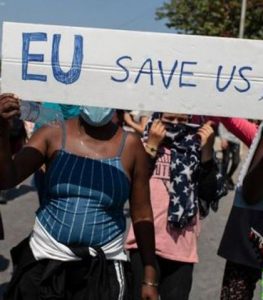UN calls for end to export of refugee responsibility
Wealthy countries should stop transferring refugees and asylum seekers to other countries, especially less developed nations, the UN refugee agency UNHCR has said.
UNHCR says the practice weakens refugees’ rights for international protection and puts their safety at risk.
 “Refugees are not commodities that can be traded by wealthier nations. To do so is dehumanizing, exploitative and dangerous,” said Gillian Triggs, UNHCR Assistant High Commissioner for Protection and former Australian Human Rights Commissioner.
“Refugees are not commodities that can be traded by wealthier nations. To do so is dehumanizing, exploitative and dangerous,” said Gillian Triggs, UNHCR Assistant High Commissioner for Protection and former Australian Human Rights Commissioner.
“UNHCR remains firmly opposed to externalization initiatives that forcibly transfer asylum seekers to other countries,” she said.
The agency warned that many countries were involved in the “forced transfer” of refugees to the global south, evading international obligations of wealthier countries and putting asylum seekers at risk of “warehousing,” where they might stay in isolated places or under fear of punitive measures.
“Such practices undermine the rights of those seeking safety and protection, demonize and punish them and may put their lives at risk,” Ms Triggs said.
“It is ironic that, as we celebrate the 70th anniversary of the Refugee Convention, attempts are being made to weaken its principles and spirit,” she said.
Ms Triggs said that countries should instead guarantee asylum rights, following principles of international laws.
By 2020 there were almost 80 million refugees and displaced people around the globe, the UNHCR reported on June 2020.
The statement comes as the United Kingdom is set to pass draconian new migration laws.
Human rights campaigners have slammed the plans contained in the proposed ‘Judicial Review Bill’ saying it will prevent immigrants and refugees from challenging deportation orders via judicial review in the UK’s High Court while also overturning earlier legal rulings.
Under new legislation, ‘illegal’ entry to the UK will impact on how an asylum claim will progress, and asylum seekers arriving by small boat will receive a new temporary protection status, with limited family reunion rights and no recourse to public funds.
It also comes as UNHCR has appealed to Tanzania to stop forcibly deporting asylum seekers fleeing violence in Mozambique’s volatile Cabo Delgado province.
Reports say Tanzania has turned back more than 4,000 Mozambican asylum seekers since September.
The UN refugee agency says this includes more than 1,500 people who have been forcibly returned in the last month. They currently are sheltering in dire conditions in the Negomano border point in Mozambique.
However, they said they were forcibly returned by authorities after trekking for days in difficult terrain and crossing a river by boat to reach Tanzania, with many women and young
About 724,000 people have been forcibly displaced since the start of the conflict in northern Mozambique’s gas-rich Cabo Delgado province in October 2017. Aid agencies have been providing protection and basic relief to 50,000 people.
The UNHCR says plans are underway to assist an additional 250,000 people by the end of the year.












